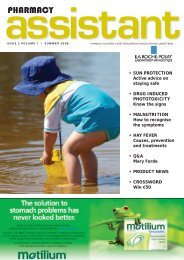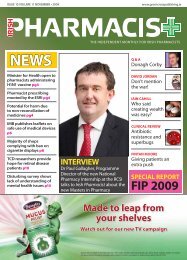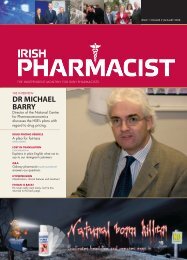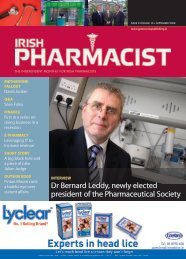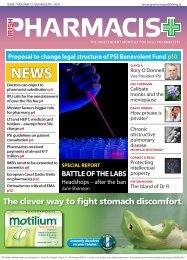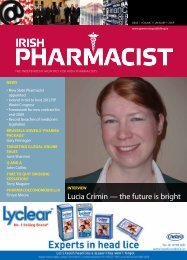inTervieW - Green Cross Publishing
inTervieW - Green Cross Publishing
inTervieW - Green Cross Publishing
Create successful ePaper yourself
Turn your PDF publications into a flip-book with our unique Google optimized e-Paper software.
24<br />
law<br />
lAw<br />
Treating children<br />
– the legal implications<br />
The law Reform Commission’s consultation paper<br />
on Children and the law: Medical Treatment has<br />
implications for the practice of pharmacy.<br />
The law considers children to be persons<br />
under the age of 18. The law Reform<br />
Commission makes over 20 provisional<br />
recommendations for reform. This is a<br />
first step in the long journey to becoming<br />
law. The paper notes the fact that there<br />
is no explicit statutory definition of what constitutes<br />
‘medical treatment’ or ‘healthcare’ and recommends<br />
that, in the context of determining the scope of consent<br />
to medical care and treatment, a broad definition of<br />
Maintain a<br />
healthy life...<br />
The only Effervescent drink with<br />
the power of 20 sun ripened oranges<br />
and Glucose in every tablet<br />
Talk to your local Pharmacist today and ask<br />
how RUBEX can help to defend your immune<br />
system from colds and fl u<br />
these terms should be used to encompass diagnosis<br />
and treatment (of course this includes pharmacological<br />
treatments) and invites submissions on the form of<br />
these definitions.<br />
Pharmacists are welcome to forward their opinions<br />
on the matters arising in this area of the Commissions<br />
work to the law Reform Commission and they will be<br />
received graciously and with great interest.<br />
The law Reform Commission provisionally recommends<br />
that:<br />
...with<br />
Rubex is used for the prophylaxis and<br />
treatment of ascorbic acid defi ciency.<br />
CorM AC o’NeIll<br />
issue 10 volume 12 • novemBeR 2010<br />
Cormac O’neill is a barrister<br />
practising on the Dublin<br />
and South Western circuits.<br />
He is also a chartered<br />
management accountant<br />
with considerable<br />
experience in industry<br />
and banking. In addition,<br />
Cormac lectures on<br />
Business and law in the<br />
Institute of Technology<br />
in Tralee and can be<br />
contacted on 087 657 1124.<br />
1. 16 and 17 year olds should be presumed to have<br />
full capacity (based on a functional test of understanding)<br />
to consent to, and refuse, medical treatment. This<br />
should apply to surgery and access to contraception.<br />
The latter being of direct interest to Irish pharmacists as<br />
they are charged with dispensing contraception.<br />
2. It should be provided in legislation that a person<br />
who is 16 years of age is presumed to have capacity to<br />
consent to and refuse healthcare and medical treatment.<br />
In the context of refusal of life sustaining treatment,<br />
it provisionally recommends that a 16 year old<br />
may make a High Court application to have his or her<br />
purported refusal appraised. It also provisionally recommends<br />
that children aged over 12 years of age but less<br />
than 14 years of age may not be regarded as being<br />
capable of refusing medical treatment and therefore<br />
any person of this age who refuses necessary treatment<br />
will be treated none the less.<br />
3. A 14 or 15 year old person could be regarded as<br />
capable of giving consent to healthcare and medical<br />
treatment, provided he or she has the capacity<br />
to understand the nature and consequences of the<br />
treatment being provided, and subject to the following<br />
conditions:<br />
a. In the opinion of the medical practitioner, the<br />
patient understands the nature and consequences of<br />
the proposed treatment;<br />
b. The medical practitioner must encourage the<br />
patient to inform his parents or guardians;<br />
c. The medical practitioner must consider the best<br />
interests of the patient; and<br />
d. The medical practitioner must have due regard to<br />
any public health concerns.<br />
There is obviously plenty of scope for conflict to arise<br />
with regard to the above guidelines. not only is the<br />
decision a pharmacist faces in this area an ethical one it<br />
may also be a legal one.<br />
4. It would be lawful for a healthcare professional<br />
such as a pharmacist to provide healthcare and medical<br />
treatment to 12 and 13 year olds provided that:<br />
a. The medical practitioner must notify the parents or<br />
guardians of the child and take account of their views;<br />
b. The medical practitioner must take account of the<br />
views of the child in question;<br />
c. The medical practitioner must consider the best<br />
interests of the patient, the pharmacist should bear in<br />
mind that some patients need to be protected from<br />
themselves; and<br />
d. The medical practitioner shall have due regard to<br />
any public health concerns. Therefore, if the disease will<br />
infect others if it is untreated the public health concerns<br />
must be addressed and accounted for in the pharmacist’s<br />
decision.<br />
5. It should be provided in legislation that a person<br />
who is 16 years of age is presumed to have capacity to<br />
make an Advance Care Directive.<br />
6. The Mental Health Act 2001 be amended to make<br />
separate provision for people under 18; that all persons<br />
under 18 who are admitted and treated under the Mental<br />
Health Act 2001 should have access to an independent<br />
advocate; and that a Mental Heath Tribunal (with<br />
an age appropriate focus) should hear from such an<br />
advocate at the earliest possible opportunity.



